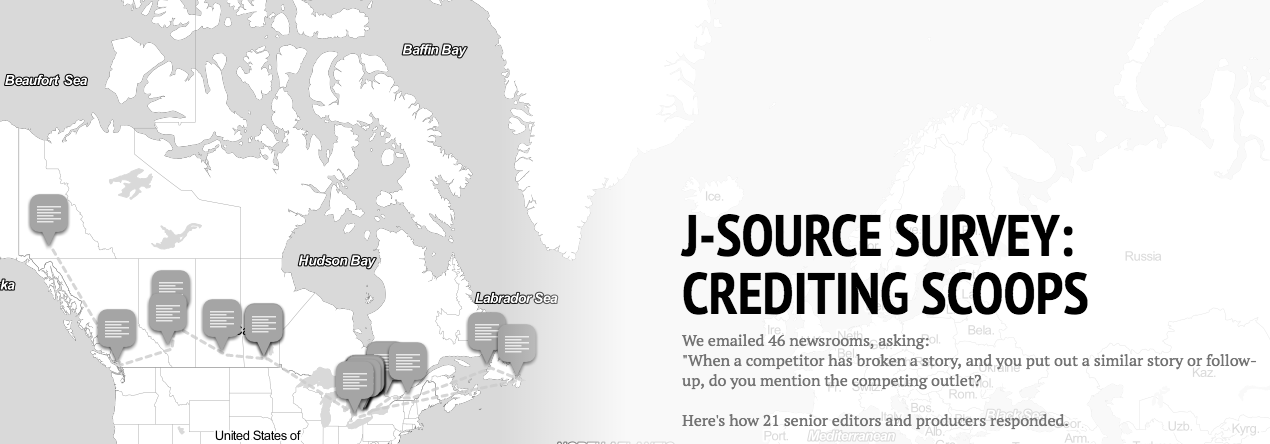Who gets the credit when a story breaks?
J-Source survey finds many outlets across Canada lack a clear policy on when to credit a competitor’s scoop.
This story was funded by the J-Source Patreon campaign.
By Dylan C. Robertson
Many media outlets across Canada lack a clear policy on when to credit a competitor’s scoop, according to a J-Source survey of English-language newsrooms.
J-Source reached out to senior editors and producers representing 46 newsrooms from each province and territory. We asked: “When a competitor has broken a story, and you put out a similar story or follow-up, do you mention the competing outlet?”
Of the 20 who responded, eight said they often credit their competition only when they can’t verify the information. Six claimed they have policies to always credit competitors, while another six said they generally do so. No agencies said they run similar stories without attribution — but 25 outlets did not respond, while another refused to participate.
“There’s very little value to the public in having a large number of media outlets drinking each others’ bathwater and telling the same stories over and over,” said CityNews Toronto’s general manager, Dave Budge. “The difference is where each outlet sets the threshold for originality.”
Deflecting liability
CityNews was one of eight outlets that says it tries to confirm news independently, and only name a competitor when it’s a big story that reporters can’t verify. Budge gave the example of initial reports that former Toronto Mayor Rob Ford smoked crack cocaine—an important story that could also lead to lawsuits.
“Clearly that’s a story that’s in the public interest, where it’s going to have an impact. It couldn’t and shouldn’t be ignored. But it’s not a piece of information that can be easily confirmed independently,” Budge said.
Jeffrey Dvorkin, director of the University of Toronto at Scarborough’s journalism program, says outlets often only name other outlets when they’re trying to ward off lawsuits
“That’s a way that some news organizations telegraph to the audience that ‘This is a slightly dubious story that we can’t verify, so if you’re going to blame anyone, blame it on the media organization that originated the story,” said Dvorkin, who was an ombudsman for NPR in the United States, and managing editor of CBC Radio.
“They think it kind of gets them off the hook. But there actually is in law something called third-party defamation,” Dvorkin said, explaining that news agencies can be held liable for repeating false, defamatory news reported elsewhere, though such lawsuits are rare.
A faster news cycle
Last month, CBC News claimed an exclusive on an online story that The Globe and Mail had published on its front page that same day, that Stephen Harper would resign as a member of Parliament.
The story’s phrase “CBC News has learned” and lack of mention of the Globe prompted mockery from journalists on Twitter. Within an hour, the network changed its story to credit the newspaper.
Steve Ladurantaye, who joined CBC News as managing editor two weeks before the story, said in an email to J-Source that his network credits competitors “until we manage to do our own reporting and advance the story beyond the original headline.
“Once we have that original reporting confirming what are often anonymous sources in other places, we’re comfortable leaving the source of the first report out unless it is integral to the understanding of the story.”
Ladurantaye said this often happens within hours, thanks to social media.
“Exclusives aren’t what they used to be. The minute we break a story and throw it up on Twitter, a slew of retweets puts it in the public domain,” wrote Ladurantaye, who used to work for Twitter.
“If someone does months of work, we have zero interest in scalping it without credit. Follows may or may not need credit depending on the context. And when it’s regular, daily journalism the scoop really does last until the story advances to the next stage.”
The public’s trust
Dvorkin said newsrooms risk eroding public trust when they try to play off scoops as their own, because part of the audience will always notice.
“It kind of undermines the public’s trust in media in general. If media organizations and the blogosphere seem to be playing fast-and-loose with the source of the information, this undermines the ability of all media to be seen as comprehensive and trustworthy.”
Budge said he encourages his CityNews colleagues not to seethe over seeing their work in other media. He often gets tips from viewers who don’t realize the story has already run elsewhere.
“Sometimes the matching of stories is intentional; sometimes it’s not,” he said. “If you spend your days worrying about that, then you’re going to waste a lot of time.”
Dylan C. Robertson is a freelance journalist covering Parliament Hill. Disclosure: He is a former employee of three Postmedia newspapers, the Toronto Star and Metro News, all of whom were part of the survey. Robertson graduated from the UTSC journalism program prior to Dvorkin’s term.
Dylan C. Robertson is an Ottawa freelance journalist covering Parliament Hill, focusing on social policy and violent extremism. He has worked at three Postmedia newspapers and the Toronto Star.

